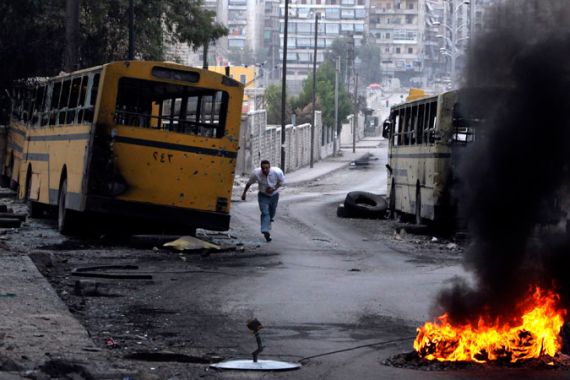Envoy urges Syrians to monitor Eid truce
Lakhdar Brahimi, visiting Jordan, repeats call for ceasefire during Muslim holiday amid reports of blast in Damascus.

The joint UN-Arab League envoy for Syria, currently visiting Jordan, has reiterated his call for a truce, urging the Syrians to monitor the proposed ceasefire themselves.
Lakhdar Brahimi has been touring the region, attempting to shore up international support for a temporary ceasefire to be established during next week’s Muslim holiday of Eid al-Adha.
“The invitation to the ceasefire, if successful, will allow us to build upon a real truce, holding all fire, and eventually, a political process which will help the Syrians solve their problems and allow them to rebuild the Syria they dream of,” Brahimi said after meeting Nasser Judeh, Jordan’s foreign minister, on Thursday.
“People are asking me who is going to monitor the ceasefire? My answer to them is no one, I call upon the Syrians to monitor themselves.”
| UN rights chief Navi Pillay defends Brahimi’s truce effort |
Speaking to Al Jazeera from Geneva, Switzerland, Navi Pillay, UN High Commissioner for Human Rights, voiced support for Brahimi’s attempt to broker a truce.
She also said war crimes appeared to have been committed by both sides in the 19-month long conflict.
“I have been looking at the facts found by the commission of inquiry,” she said.
“They all point to war crimes being committed there, both by the government forces and the rebel forces, and I echo the call of the secretary-general, and now Mr Brahimi, for an immediate stop to the killings; a ceasefire.”
Pillay said UN officials were still trying to verify whether or not forces loyal to Syrian President Bashar al-Assad had used cluster munitions.
“I myself saw video footage of these cluster bombs,” she said.
“They are illegal, and international law forbids the use of cluster bombs, particularly on the part of state authorities … There would certainly be a very serious violation of international humanitarian law, because of how dangerous they are and how indiscriminately they can damage and kill people when they land on the ground and burst.”
At least 44 people, including women and children, were killed on Thursday as fighter jets pounded the rebel-held town of Maaret al-Numan, said rescue workers.
They said bombs destroyed two residential buildings and a mosque in the strategic northwestern town, which
was captured by rebel fighters on October 9 in a push to create a buffer zone along the Turkish border.
Rebels say they have launched a “final assault” on Wadi Deif army base in northwestern Syria – a key depot for tanks and fuel supplies.
Meanwhile, the Syrian Observatory for Human Rights said that at least 135 people were killed, including 53 civilians, in violence across the country during the day.
Refugee crisis
The conflict has claimed about 30,000 lives so far, according to the opposition. The UN says about 350,000 people have now fled the violence in Syria and entered the four countries bordering the war-torn nation.
Many more have been displaced within the country’s borders.
Iraq has received more than 46,000 refugees, while about 96,000 have entered Lebanon.
More than 100,000 Syrians have sought refuge in Turkey, while nearly 106,000 are living in camps in Jordan, where a school has been set up for Syrian children in the al-Zaatari refugee camp.
Temporary classrooms are better than no classrooms, say the students, but conditions in the school, run by UNICEF, leave a lot to be desired.
“We’re studying in tents in the middle of the desert just like the tents we live in,” Asmaa, an eleventh-grade student from the city of Deraa, told Al Jazeera.
“Nothing has changed. We’re suffocating here. The scorching heat is roasting us. The toilets are so vile you can’t stand using them, and the tap water is boiling.”
UNICEF’s Simon Ingram says that conditions in the camp will soon improve, and has appealed to international donors to help the agency protect the children, especially as the bitter cold of winter will soon set in.
“It has to be said that things are not perfect … but a lot has been done in a very short space of time,” Ingram told Al Jazeera from Amman, Jordan.
“Just adjacent to that very site, construction is already well advanced on what will be prefabricated buildings to house even more children, as the needs of the camp rise faster than ever – and that’s been the other issue that we’ve had to contend with, along with our partners from the ministry of education.”
Establishing the school inside the camp is a sign that Jordan is preparing for the Syrians to be here for a long time, though many of the 2,400 children enrolled want to return home, where facilities are better and textbooks are more plentiful.
On the ground, meanwhile, fighting continued in Syria, with reports of an explosion in Damascus near an office of the intelligence services.
Syrian state television said a motorcycle bomb exploded in the Kafr Souseh neighbourhood, but that no one was injured.
The state-run news agency also said rebel fighters had blown up two oil and gas pipelines near the Iraqi border, while activist video posted on YouTube purported to show an attack on Maraat Horma, in Idlib province, where heavy shelling continues to be reported.